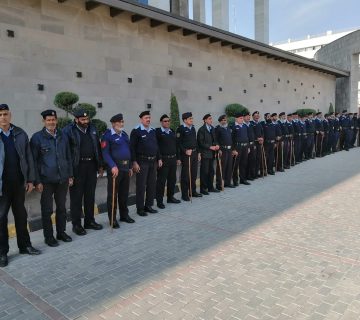ISLAMABAD, Aug 31: The Supreme Court (SC) dismissed on Thursday the Election Commission of Pakistan’s (ECP) plea seeking a review of the apex court’s order calling for elections in Punjab to be held on May 14.
The verdict was unanimously announced by a three-member bench headed by Chief Justice of Pakistan Umar Ata Bandial and comprising Justice Munib Akhtar and Justice Ijazul Ahsan.
In its April 4 order, the SC had not only declared as “unconstitutional” the ECP’s decision to move the Punjab polls date to October 8 from April 10, but also set May 14 as the new date for polls in the province, in a blow to the then coalition government that was seen dragging its feet on provincial elections.
On March 22, the ECP delayed the provincial assembly election in the politically crucial Punjab province by more than five months, citing the deteriorating security situation in the cash-starved country, a move criticised by PTI chairman Imran Khan.
Since his ouster last April 2023 in a no-confidence vote in parliament, Imran had been demanding early elections. Then premier Shahbaz Sharif dismissed the demand and kept to elections scheduled for later this year.
The PDM government wanted national elections and the voting for the two provincial assemblies held on the same day.
In early May, the ECP had filed a petition seeking a review of the earlier order maintaining that changing the election programme was the solitary domain of the ECP under Section 58 of the Elections Act, 2017.
During the proceedings today, the ECP lawyer requested the court for a week’s time. “The SC has issued detailed orders on the Punjab polls issue,” he said, “in preview of this detailed verdict, more time is required to give arguments on additional grounds”.
However, the request was not granted by the court.
The ECP lawyer then argued that according to the new law, only the ECP has the power to announce elections, but this argument was also shot down by the bench as Justice Akhtar observed that “this question is not before us right now, we are only hearing the review petition”.
The judge then proceeded to ask the lawyer to argue if there were any errors or inconsistencies in the judgment itself that mandated a review.
CJP Bandial furthered that “not only do you have the right to announce polls, but it is your [ECP’s] constitutional duty.
Justice Akhtar remarked that it is clearly stated in the Constitution that elections are to be held within 90 days while Justice Ahsan stressed that the constitutional mandate of holding elections within 90 days of passing the law cannot be changed. “The ECP cannot delay the elections for more than 90 days,” he said.
The ECP lawyer argued that there was some room for exceptions to the 90-day limit and said that “there are some mistakes in the Supreme Court’s decision”.
Justice Ahsan however observed that “Article 281 (3) of the Constitution postulates that it is the ECP’s responsibility to organize and conduct elections” and that it must do so within the constitutionally mandated period of 90 days. “Then how did the ECP grant itself this flexibility to delay elections?” he inquired.
The ECP lawyer responded by arguing that “it is also the ECP’s responsibility to ensure free and fair elections”, to which Justice Ahsan asked, “if free and fair elections cannot be guaranteed for five years then would that mean elections would not be held the entire time?”.
The CJP told the lawyer to point out where the flaws in the SC orders lay.
Justice Ahsan stressed that the electoral watchdog cannot postpone the elections beyond 90 days, even if a new law has been introduced. “The ECP cannot say that there is a new law, so it does not matter if polls are not held for even 690 days” as the body was bound by the Constitution.
The ECP lawyer agreed that “the Constitutional mandate cannot be exceeded but also stressed that the provisions mandating polls within the 90-day limit must be read in conjunction with Article 254 which states that under certain circumstances, elections can be delayed.
“How can the ECP decide about the specific circumstances on its own?” questioned Justice Ahsan, upon which the lawyer said that the power of Article 218(3) can be used only by the commission and not by the court.
Justice Ahsan however reiterated his earlier question, “Who granted the ECP the constitutional mandate to delay elections beyond 90 days?”
The court once again told the lawyer to argue what flaws lay in the earlier SC order.
“The mistake is that it states that the ECP cannot delay elections beyond 90 days,” he responded.
Justice Akhtar said that if the watchdog finds obstacles in the provision of free and fair elections, it can come to court but stressed that the ECP cannot decide by itself not to hold elections.
At one point, CJP Bandial observed that, “The court will intervene whenever there will be a constitutional violation.”
Later, the apex court dismissed the commission’s review petition on the issue of Punjab elections.




No comment